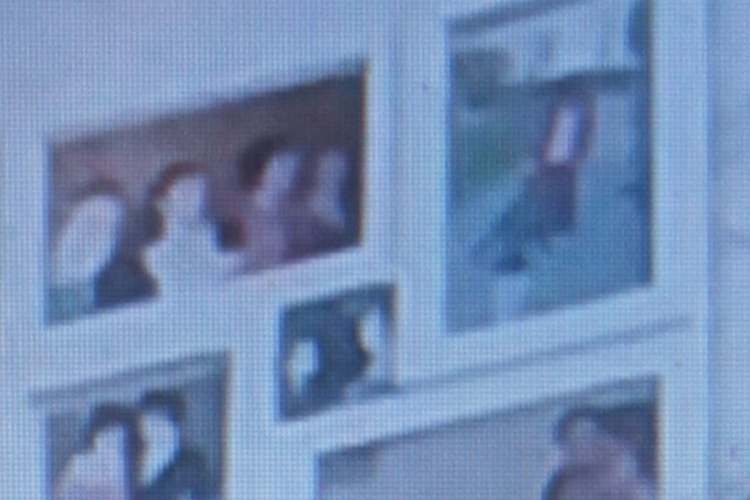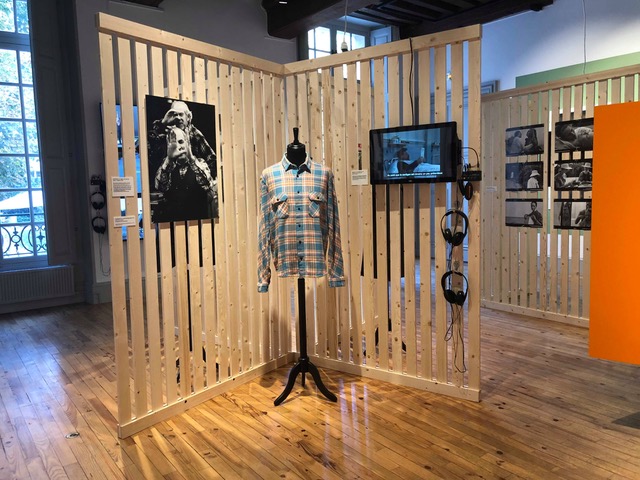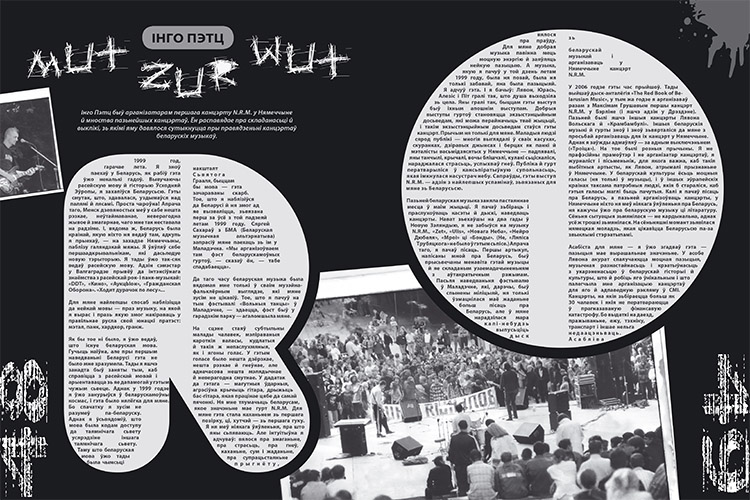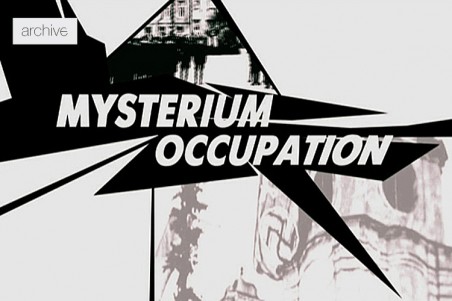
Mysterium Occupation, dir. A.Kudzinienka
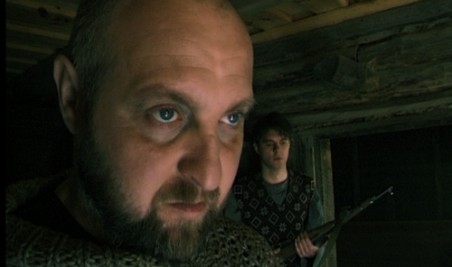
Mysterium Occupation, dir. A.Kudzinienka
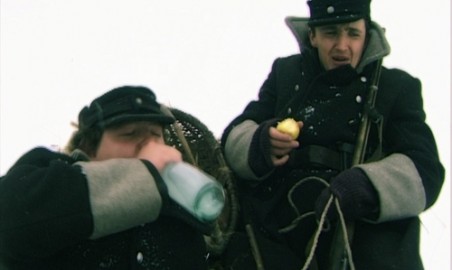
Mysterium Occupation, dir. A.Kudzinienka
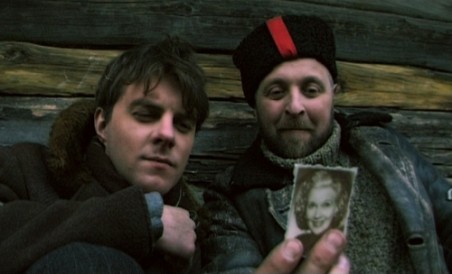
Mysterium Occupation, dir. A.Kudzinienka
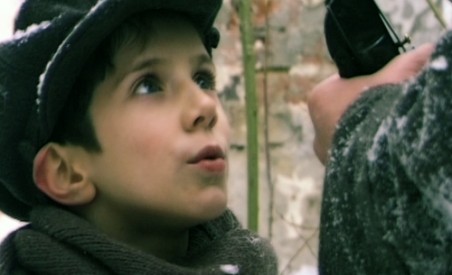
Mysterium Occupation, dir. A.Kudzinienka
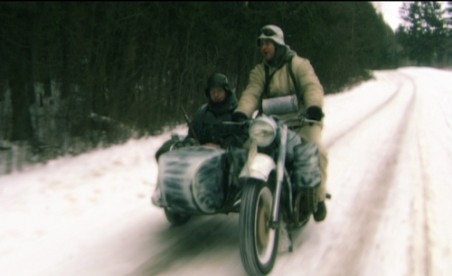
Mysterium Occupation, dir. A.Kudzinienka
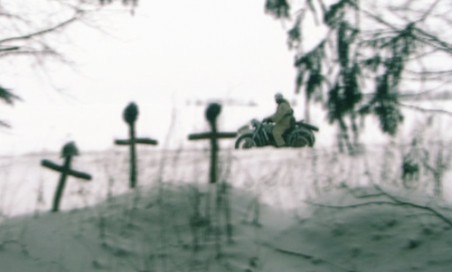
Mysterium Occupation, dir. A.Kudzinienka
Archive! © Published in pARTisan #3’2004
The official Belarusian film industry is now in a coma. Neither random injections of tiny budget funds, nor the authorities’ calls to shape some vague ‘national ideology’ in a movie can bring it back to life. The actual creative film-making is going on a long way from the state-owned Belarusfilm studio and the Ministry for Culture. Having lived under cultural occupation for ages, the country has bred a new generation of intellectual partisans. Mysterium Occupation, by Andrej Kudzinienka feature film, is the best sample of creative postcolonial thought. It is not on at the cinemas, nor can you get it from any video shop, although it has stirred a good deal of interest among Belarusian audiences and was a success at the Rotterdam festival.
Saying good-bye to the old Soviet partisan mythology, Mysterium Occupation aspires to create a new national myth. Director Andrej Kudzinienka has agreed to discuss paradoxes of ‘partisan film-making’ for pARTisan:
Maksim Źbankou: Your picture is in great demand, but there is no way of meeting it. Sounds quite partisan-like.
Andrej Kudzinienka: It helps arouse public curiosity. I am getting lots of phone calls from people asking for a copy or giving their feedback. There was even a call from the official mouthpiece Soviet Byelorussia, ‘We would like to discuss with you if it is really necessary to produce such a vivid picture of war as in your film’.
M.Ź.: Who is to promote Mysterium Occupation in Belarus?
A.K.: We are going to do that ourselves. It would be interesting to see if this kind of picture can be sold in this country.
M.Ź.: Did it take you long to shoot Mysterium Occupation?
A.K.: The first episode was shot from February till May 2001. It was in striking contrast with the heavily-subsidised blockbuster The August of 1944, released just about the same time. The whole of the picture had been completed by June 22, 2003. Its full-length version has a higher level of integrity and makes a much more positive impression.
M.Ź.: An alternative spoken history of World War II as the picture’s underlying idea is deliberately astounding. You cannot but notice some parallels with The Siege Book by Daniel Granin and Ales Adamovich.
A.K.: Do not forget Vasil Bykau… By the way, experts on the wartime were glad to share with us lots of materials, mostly unpublished. We wanted to give our stories some universal character, so the style was in a way predetermined by classical Greek tragedy. While working on the mother’s story I couldn’t put Medea out of my mind. As for cinematographic analogies, there is a slight touch of the Kohen brothers in the first episode and then I was just haunted by Pasolini.
M.Ź.: How would you define the Mysterium Occupation genre?
A.K.: Catharsis, some inner purification arising out of a tragedy. The draft script had a happy ending, but I strongly objected. Roman Polanski dubs happy-ending pictures ‘lavatorial’. A beautiful scene in the end – and all the rest is washed away. But a tragic ending is something that gets you hooked and torments long afterwards.
M.Ź.: How did you do the casting?
A.K.: That wasn’t easy. We did not have any shade of doubt about Shtyrkin, though. Hardly had Alaksandar Kolbyshau read the script when he said, ‘The part is mine. Or else I’ll turn your life into a misery.’ As for Anatol Kot, I bumped into him in a corridor just by chance! It was my idea to shoot him wearing a hat. I had been surprised at partisans’ strange clothing as I was watching archive materials. They all had hats with stars on them, just like guys in a western. Very different from our movies! But we decided to shoot Štyrkin in a papakha, it is a sign people are accustomed to. By the way, for some reason it is artists, not directors or actors who always give the best advice on casting.
M.Ź.: Did everything go smooth with the music?
A.K.: The music is by Andrey Volkov from St.Petersburg. It was his debut as a film composer. When I gave him the script to read, Andrey composed music to all of the film, actually. But it was too gloomy, too depressing. We began working on it together. I wanted something western style. Of course it was Morricone’s influence.
M.Ź.: Morricone is really present here. And the episode of the policeman and his partisan neighbour reminds of spaghetti westerns à la Sergio Leone.
A.K.: And Morricone worked for none other than Leone! Some people compare our film to The Dead Man, saying Anatol Kot and Johnny Depp are very much alike.
M.Ź.: Did you assume the film would cause mixed response from the audiences?
A.K.: This is exactly what we intended to get. We understood only too well that we could easily receive a rap over the knuckles.
M.Ź.: Were you afraid?
A.K.: No. We tried to do the shooting in a partisan-like manner, keeping it as much a secret as possible.
M.Ź.: It may sound naive, but still, why didn’t you shoot it at Belarusfilm? Why did you have to resort to partisan practices?
A.K.: I cannot imagine a quality picture being shot at Belarusfilm! And besides, they are under censorship of ‘the artistic council’. You cannot escape the feeling that they consciously choose the worst. Perhaps they want films to be less challenging, more commonplace and conventional.
M.Ź.: Did you quit Belarusfilm for creative or administrative reasons?
A.K.: Both. They won’t work with us. They ignore our projects and what they suggest is of no interest to us.
M.Ź.: What are the distinctive features of independent film-making Belarusian style?
A.K.: Post-production takes up too much time. We had to begin at naught, inventing our own techniques, particularly with the sound effects. We experimented on our home computers, then in a studio, we made lots of mistakes. Certainly, there are recognised technologies, but they cost a fortune. We wanted to record all the sound effects ourselves. Quality sound is the first thing that counts in our partisan-like situation. It took loads of time.
M.Ź.: Are you content with your present partisan status?
A.K.: No, everyone dreams of the Cannes stairs. But on the other hand, what, say, Telefilm offered me would be nothing other than slavery. My ultimate goal is ‘to work for my own little company, making low-budget films,’ because ‘it is better to lose your virginity than independence,’ as Brodsky put it.
Views expressed are those of the authors and may not reflect opinion of the editors. If you note any error, please contact us right away..




